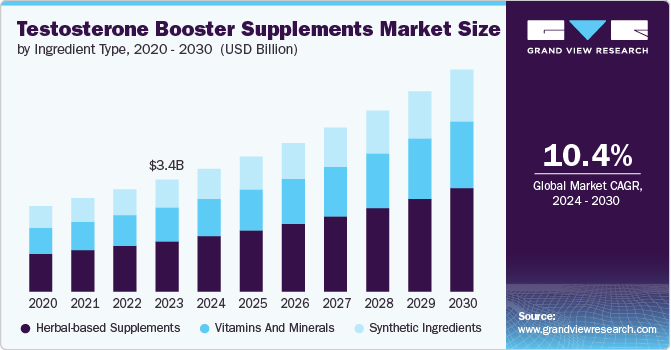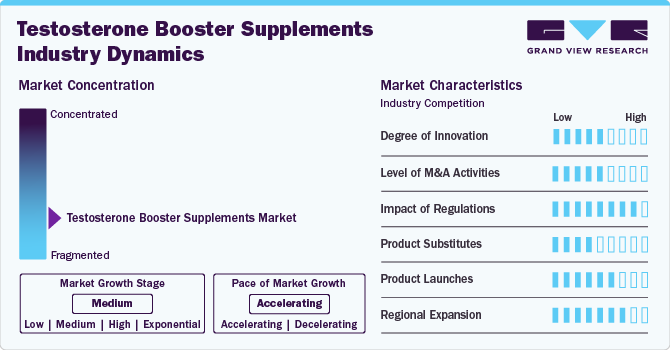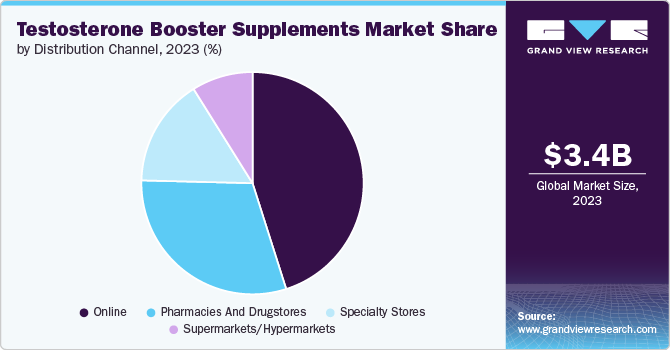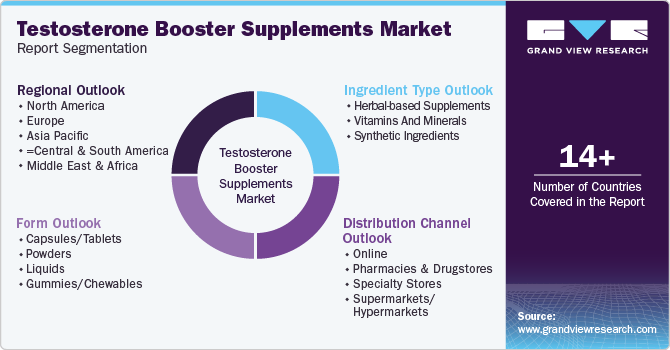
Testosterone Booster Supplements Market Size, Share & Trends Analysis Report By Ingredient Type, By Form, By Distribution Channel, By Region, And Segment Forecasts, 2024 - 2030
- Report ID: GVR-4-68040-471-9
- Number of Report Pages: 120
- Format: PDF
- Historical Range: 2018 - 2023
- Forecast Period: 2024 - 2030
- Industry: Consumer Goods
Market Size & Trends
The testosterone booster supplements market size was valued at USD 3.40 billion in 2023 and is projected to grow at a CAGR of 10.4% from 2024 to 2030. The market growth has been increasing significantly in recent years, driven by a combination of health, fitness, and lifestyle trends, along with increased awareness regarding testosterone’s role in men’s health. Moreover, the rise in demand for these products can be attributed to a variety of factors, including an aging population, increased interest in fitness, sports performance, and overall well-being. Besides, manufacturers are increasingly innovating and launching new products to meet the demand, further propelling the market growth.

One of the most significant drivers of the market is the aging population. As men age, testosterone levels naturally decline, typically starting around age 30; this decline can lead to a variety of symptoms, including decreased energy, reduced muscle mass, weight gain, fatigue, mood swings, and diminished libido. This natural decline has led many older men to seek out testosterone boosters as a solution for maintaining vitality and well-being. According to a report by the National Ins titute of Health, the number of people aged 65 and over is expected to nearly double from 48 million to 88 million by 2050. This trend indicates a large potential consumer base for testosterone booster supplements, particularly as awareness of testosterone declines and its effects on health become more widespread.
Another critical driver of the market is the increasing interest in fitness, bodybuilding, and athletic performance. Testosterone plays a pivotal role in building muscle mass, increasing strength, and boosting athletic performance, which makes testosterone boosters particularly appealing to fitness enthusiasts and bodybuilders. Moreover, the fitness industry has witnessed exponential growth, especially with the rise of social media platforms promoting fitness influencers and workout culture. Many of these influencers endorse testosterone-boosting products as part of their routines, further driving consumer interest.
Awareness about testosterone deficiency (also known as hypogonadism) has grown significantly in recent years. Men experiencing symptoms of low testosterone, such as fatigue, weight gain, and reduced sexual function, are increasingly seeking medical advice and exploring options to boost their testosterone levels. This increased awareness has led to a surge in the consumption of over-the-counter testosterone boosters, as many men view supplements as a more accessible and less invasive option compared to hormone replacement therapy (HRT). Several medical organizations and publications have raised awareness about the symptoms of low testosterone, leading to more men seeking solutions. As a result, the demand for supplements that can naturally support healthy testosterone levels is on the rise.
Market Concentration & Characteristics
The market exhibits moderate innovation, primarily driven by advancements in formulation technologies and the incorporation of scientifically backed ingredients like herbal extracts and micronutrients. Innovations focus on improving bioavailability, multi-functional supplements, and consumer-friendly formats like gummies.
Mergers and acquisitions in the market are relatively active as larger health and wellness companies seek to expand their product portfolios and gain a competitive edge. Acquiring smaller, innovative brands helps established companies enter niche markets, capitalize on emerging trends like natural supplements, and gain access to novel formulations or proprietary research in testosterone-boosting ingredients.

Regulations play a crucial role in shaping the market, especially concerning ingredient safety and marketing claims. Regulatory bodies such as the FDA and EFSA ensure that supplements do not contain harmful substances and that companies make evidence-based claims. These regulations encourage manufacturers to adopt higher safety standards but can also pose challenges, slowing down product approvals and market entry in some regions.
Substitutes for testosterone booster supplements include hormone replacement therapies (HRT), anabolic steroids, and natural remedies such as dietary and lifestyle modifications. HRT and anabolic steroids offer more direct interventions but come with potential side effects and are often prescription-based. On the other hand, dietary changes and regular exercise can naturally boost testosterone levels, making them viable alternatives for those seeking non-supplement solutions.
The market has seen a consistent number of product launches, with companies introducing innovative formulations, such as blends of herbal and micronutrient-based supplements in capsule or gummy forms. Clean-label, organic, and vegan testosterone boosters are increasingly popular, catering to the growing consumer demand for health-conscious and eco-friendly products. New product launches often focus on addressing multiple aspects of men's health, such as vitality and energy.
North America continues to dominate the market, but companies are increasingly expanding into Asia Pacific, where the market is growing at the fastest pace. Emerging markets in Asia and Latin America are gaining attention due to increasing health awareness, urbanization, and rising disposable incomes. Expansion strategies often involve localized product offerings and compliance with region-specific regulatory frameworks.
Ingredient Type Insights
Herbal-based testosterone booster supplements held a revenue share of 45.0% in 2023 due to consumer preference for natural and organic products over synthetic ones. These supplements contain ingredients like Tribulus Terrestris, Fenugreek, Ashwagandha, and Tongkat Ali, which have been traditionally used to enhance testosterone levels and improve overall vitality. One of the primary drivers for the large market share of herbal supplements is the growing awareness among consumers about the potential side effects of synthetic supplements. Many synthetic ingredients, especially anabolic steroids and other synthetic testosterone boosters, have been linked to adverse health effects, including liver damage, cardiovascular diseases, and hormonal imbalances. As a result, consumers are seeking safer, more natural alternatives.
Vitamin and mineral-based testosterone booster supplements are expected to grow at a CAGR of 10.3% from 2024 to 2030. This growth is primarily driven by increasing awareness of the essential role that micronutrients play in testosterone production and overall male health. Moreover, vitamins and minerals such as Vitamin D, Zinc, Magnesium, and Vitamin B6 are crucial for the body’s ability to produce testosterone. Vitamin D, for example, has been shown to play a direct role in testosterone regulation, with deficiencies in this vitamin often linked to lower testosterone levels. Besides, zinc is another key nutrient, as it aids in the synthesis of testosterone and is crucial for maintaining normal levels in the bloodstream. The rising prevalence of vitamin and mineral deficiencies globally is also driving demand for this category of supplements.
Form Insights
Capsules/Tablets held a revenue share of 55.8% in 2023. Capsules are easy to consume, portable, and have a longer shelf life compared to other forms like liquids and powders. This makes them a preferred choice for consumers who want a hassle-free supplementation experience. Capsules also allow for precise dosage control, ensuring that users can easily monitor and adjust their intake to achieve optimal results. This is particularly important in testosterone supplementation, where the balance between efficacy and safety is crucial. Unlike powders or liquids, where dosage can sometimes be inconsistent, capsules provide a standardized amount of active ingredients in each serving.
Gummies/Chewables is expected to grow at a CAGR of 12.1% from 2024 to 2030. One of the main factors behind this rapid growth is the increasing demand for supplements that offer both functionality and enjoyment. Gummies and chewables are often seen as more enjoyable to consume compared to traditional capsules or powders, making them particularly appealing to younger demographics and those who may have difficulty swallowing pills. Moreover, the growing popularity of functional food products has further fueled the demand for gummies and chewables. Consumers are increasingly looking for supplements that can be integrated into their daily routines without feeling like a chore, and gummies/chewables meet this need by offering a tasty and convenient alternative. This trend is particularly pronounced in markets where wellness and convenience intersect, such as in North America and Europe.
Distribution Channel Insights
The sales of testosterone booster supplements through online channels accounted for a revenue share of 45.1% of the market in 2023, driven by the increasing penetration of e-commerce platforms and changing consumer purchasing habits. The convenience of online shopping, coupled with the ability to access a wide range of products, has made e-commerce the preferred choice for many consumers looking for testosterone supplements. Moreover, consumers can easily compare different brands, ingredients, pricing, and reviews, allowing them to make informed purchasing decisions. This transparency has helped build trust in online platforms as reliable sources for purchasing supplements.

The sales of testosterone booster supplements through specialty stores are expected to grow at a CAGR of 10.6% from 2024 to 2030. Specialty stores, which focus on health, wellness, and nutrition products, offer a level of personalized service and expert guidance that is difficult to replicate online. In specialty stores, consumers can receive tailored advice from knowledgeable staff who understand the nuances of testosterone boosters and can recommend products based on individual needs. This level of trust and expert guidance is a key driver for consumers who prefer in-person shopping, particularly when purchasing supplements for sensitive health issues like hormonal balance.
Regional Insights
North America testosterone booster supplements market accounted for a revenue share of 40.1% in 2023 due to the high level of consumer awareness surrounding testosterone health. The region has seen widespread public discussion about low testosterone levels and the benefits of supplementation, particularly in the United States. Moreover, media coverage, advertisements, and increasing healthcare awareness campaigns have made testosterone boosters a mainstream product in North America, encouraging widespread use. Besides, North America has a well-established market for dietary supplements in general, with a mature regulatory framework and high consumer trust in the safety and efficacy of these products. The region is home to numerous leading supplement manufacturers, which has helped promote testosterone boosters as part of the larger health and wellness industry.
U.S. Testosterone Booster Supplements Market Trends
The growing awareness of men's health and wellness, particularly regarding energy, endurance, and muscle strength, is driving the demand for testosterone booster supplements in the U.S. Increasing cases of low testosterone levels due to aging, stress, and lifestyle changes have fueled demand for natural supplements. The rise of fitness and bodybuilding trends also boosts market growth, as athletes seek performance enhancement. Additionally, the surge in e-commerce platforms and widespread marketing strategies, particularly through social media, have made these supplements more accessible. A shift towards plant-based, organic ingredients also appeals to health-conscious consumers, further driving the market's expansion.
Asia Pacific Testosterone Booster Supplements Market Trends
Asia Pacific testosterone booster supplements market is expected to grow with a CAGR of 11.3% from 2024 to 2030. The Asia Pacific region is witnessing a significant increase in health consciousness and awareness of testosterone-related issues, especially among men. Moreover, consumers in countries like China, India, and Japan become more educated about the benefits of testosterone boosters for fitness, vitality, and general health, and the demand for these supplements is growing rapidly. Besides, economic growth in several Asia Pacific countries has led to a rise in disposable income, enabling more consumers to afford premium health and wellness products. As middle-class populations expand, there is a growing demand for supplements that address lifestyle-related health concerns, including hormonal imbalances and reduced testosterone levels.
Key Testosterone Booster Supplements Company Insights
The market participants are constantly working towards new product launches, partnerships, M&A activities, and other strategic alliances to gain new market avenues. The following are some instances of such initiatives.
Key Testosterone Booster Supplements Companies:
The following are the leading companies in the testosterone booster supplements market. These companies collectively hold the largest market share and dictate industry trends.
- TestoFuel
- Prime Male
- Hunter Test
- Nugenix
- Testogen
- Force Factor
- EVLution Nutrition
- MuscleTech
- JYM Supplement Science
- GAT Sport
Recent Developments
-
In November 2023, Jagat Pharma, a prominent name in India's ayurvedic pharmaceutical sector, introduced a new Testosterone Booster designed to enhance energy, endurance, and muscle strength. This innovative supplement aims to elevate testosterone levels, thereby supporting muscle development and boosting overall energy. It also improves focus, stamina, and physical strength, enabling users to perform better in various aspects of their lives.
Testosterone Booster Supplements Market Report Scope
|
Report Attribute |
Details |
|
Market size value in 2024 |
USD 3.74 billion |
|
Revenue forecast in 2030 |
USD 6.75 billion |
|
Growth rate |
CAGR of 10.4% from 2024 to 2030 |
|
Actuals |
2018 - 2023 |
|
Forecast period |
2024 - 2030 |
|
Quantitative units |
Revenue in USD million/billion and CAGR from 2024 to 2030 |
|
Report coverage |
Revenue forecast, company ranking, competitive landscape, growth factors, and trends |
|
Segments covered |
Ingredient type, form, distribution channel, region |
|
Regional scope |
North America; Europe; Asia Pacific; Central & South America; Middle East & Africa |
|
Country scope |
U.S, Canada, Mexico, UK, Germany, France, Italy, Spain, China, Japan, India, Australia & New Zealand, South Korea, Brazil, South Africa |
|
Key companies profiled |
TestoFuel; Prime Male; Hunter Test; Nugenix; Testogen; Force Factor; EVLution Nutrition; MuscleTech; JYM Supplement Science; GAT Sport |
|
Customization scope |
Free report customization (equivalent up to 8 analysts working days) with purchase. Addition or alteration to country, regional & segment scope. |
|
Pricing and purchase options |
Avail customized purchase options to meet your exact research needs. Explore purchase options |
Global Testosterone Booster Supplements Market Report Segmentation
This report forecasts revenue growth at the global, regional, and country levels and provides an analysis of the latest industry trends and opportunities in each of the sub-segments from 2018 to 2030. For this study, Grand View Research has segmented the global testosterone booster supplements market report based on ingredient type, form, distribution channel, and region:

-
Ingredient Type Outlook (Revenue, USD Million, 2018 - 2030)
-
Herbal-based Supplements
-
Vitamins And Minerals
-
Synthetic Ingredients
-
-
Form Outlook (Revenue, USD Million, 2018 - 2030)
-
Capsules/Tablets
-
Powders
-
Liquids
-
Gummies/Chewables
-
-
Distribution Channel Outlook (Revenue, USD Million, 2018 - 2030)
-
Online
-
Pharmacies And Drugstores
-
Specialty Stores
-
Supermarkets/Hypermarkets
-
-
Regional Outlook (Revenue, USD Million, 2018 - 2030)
-
North America
-
U.S.
-
Canada
-
Mexico
-
-
Europe
-
UK
-
Germany
-
France
-
Italy
-
Spain
-
-
Asia Pacific
-
China
-
Japan
-
India
-
Australia & New Zealand
-
South Korea
-
-
Central & South America
-
Brazil
-
-
Middle East & Africa
-
South Africa
-
-
Frequently Asked Questions About This Report
b. The global testosterone booster supplements market size was estimated at USD 3.40 billion in 2023 and is expected to reach USD 3.74 billion in 2024.
b. The global testosterone booster supplements market is expected to grow at a compounded growth rate of 10.4% from 2024 to 2030 to reach USD 6.75 billion by 2030.
b. Herbal-based testosterone booster supplements dominated the testosterone booster supplements market with a share of 45.0% in 2023.One of the primary drivers for the large market share of herbal supplements is the growing awareness among consumers about the potential side effects of synthetic supplements.
b. Some key players operating in the testosterone booster supplements market include TestoFuel , Prime Male, Hunter Test, Nugenix, Testogen, Force Factor, EVLution Nutrition, MuscleTech , JYM Supplement Science, and GAT Sport.
b. The testosterone booster supplements market has been growing significantly in recent years, driven by a combination of health, fitness, and lifestyle trends and increased awareness regarding testosterone’s role in men’s health.
We are committed towards customer satisfaction, and quality service.
"The quality of research they have done for us has been excellent."




